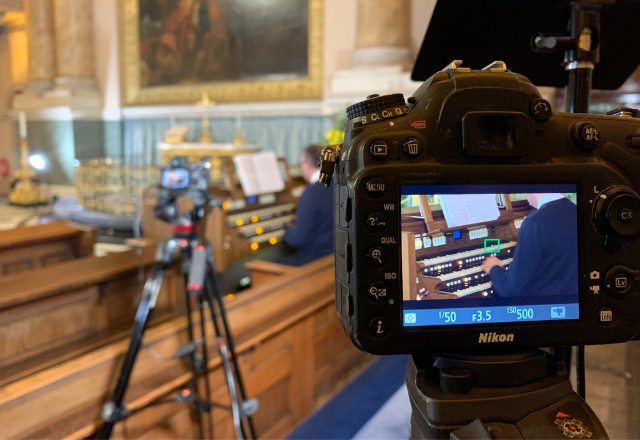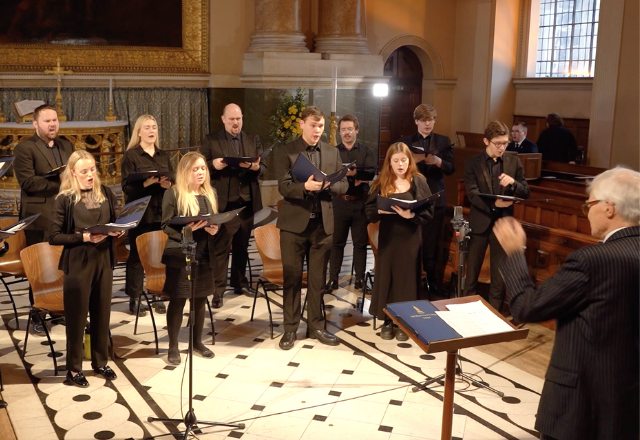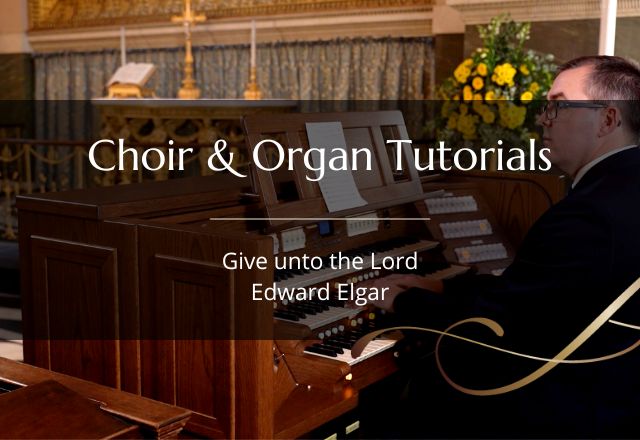Elgar’s epic anthem, “Give unto the Lord”, is the third release in this year’s series of choir and organ tutorials from Ralph Allwood and the choir of the Old Royal Naval College chapel in Greenwich. In an engaging lesson lasting nearly forty minutes, Ralph and Jonathan Eyre discuss how to perform and accompany this monumental piece of music.
Give unto the Lord – Written by Elgar in 1914
“Give unto the Lord”, Op. 74, was written by Elgar in 1914 for a festival of the Sons of the Clergy, held at St Paul’s Cathedral, the piece being dedicated to Sir George Martin, the cathedral’s organist. (The Corporation of the Sons of the Clergy was one of those doughty old charities that offered support to clergy families, these days going by the name of the Clergy Support Trust, after some soul-searching about the suitability of its title in modern contexts.)
Elgar’s anthem has that confident and broad style so typical of Edwardian church music, having been written originally with an orchestral accompaniment. As Ralph explains, the cathedral would almost certainly have been packed for the event, and the work was written on the sort of scale that was needed to project the sound to the back rows.
As church anthems go, “Give unto the Lord” is on the long side, the performance lasting some nine minutes. Such a long work demands an extended rehearsal, and for that reason we’ve chosen to separate the recordings here, one of them including the entire rehearsal before the performance, and the other including only the performance. If you’re interested in learning about directing, accompanying or singing this piece then the entire rehearsal (above) is highly instructive and well worth watching. Otherwise, you can simply enjoy a polished performance (below).
Many challenges playing this anthem on the organ
Early on in the rehearsal Ralph asks Jonathan to explain some of the challenges in rendering such a busy and demanding orchestral accompaniment on the organ. One of the first things to note, Jonathan points out, is that the organist simply can’t manage without a page turner as there’s so much going on. The size of the orchestra and the complexities of some of the solo parts mean that quite a few compromises have to be made in an organ reduction, because you can’t bring out all the solo parts at the same time.

The approach to accompanying the Elgar is very different to the relatively simple organ management demonstrated during our previous tutorial, a Schubert mass movement. There’s a fiendish section during “the God of glory thundereth”, for example, where the pedal line is going full tilt in quavers, the swell boxes have to be closed and various pistons changed, all at the same time. It places huge demands on the organist, but at the same time it allows for a number of the tone colours of the Viscount instrument to be demonstrated nicely.
One hears the clarinet and cor anglais stops, for example, as well as the solo tuba. In a nice touch there’s even a harp that pops up at an appropriate point during the “In his temple…” section. Elgar scored a harp in the orchestral version, and it just so happens that the Regent 356 instrument featured here has such a sound available on one of its orchestral stops. Is it too cheesy to use it? Ralph seems to quite like the idea, so takes a vote among the choir. Overwhelmingly they decide that it’s a good thing so Jonathan brings on the harp, which you can listen for in that part of the anthem.

The words based on Psalm 29
All that said, then, it’s a case of “hold on to your seats” and enjoy this feast of Edwardian church music — surely one of the highlights of the Anglican choral repertoire. The words, based on Psalm 29, are given below. You can see that they lend themselves well to such a dramatic musical treatment.
Give unto the Lord, O ye mighty,
give unto the Lord glory and strength,
give unto the Lord the glory due unto His name.
Worship the Lord in the beauty of holiness.
The voice of the Lord is upon the waters:
the God of glory thundereth;
it is the Lord that ruleth the sea.
The voice of the Lord is mighty in operation;
the voice of the Lord is full of majesty;
the voice of the Lord breaketh the cedars.
yea, the breaketh the cedars of Lebanon.
The voice of the Lord divideth the flames of fire,
the voice of the Lord shaketh the wilderness
and strippeth the forests bare.
In His temple doth every one speak of His glory.
The Lord sitteth above the water-flood;
and the Lord remaineth a King for ever.
The Lord shall give strength unto His people;
the Lord shall give His people the blessing of peace.

I’m a retired academic, with a background in music and audio engineering. I’m currently a consultant for Viscount & Regent Classic Organs, as well as being a freelance organist, including a role as organist/choirmaster at St Mary’s, Witney. I sing bass with Oxford Pro Musica Singers and the Cathedral Singers of Christ Church, Oxford.



